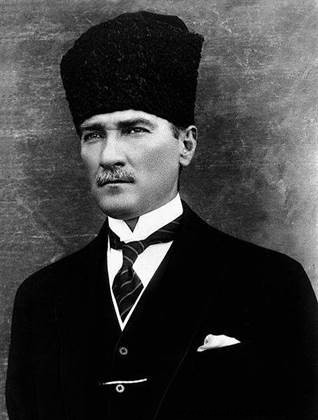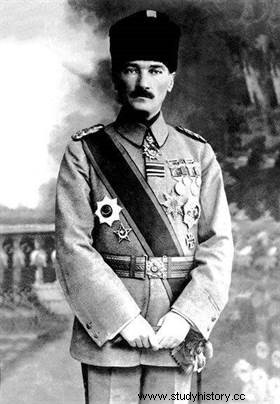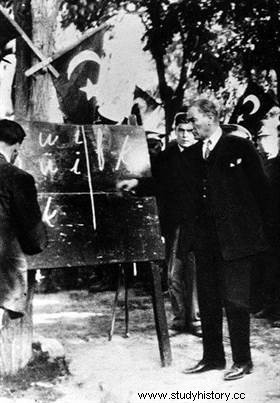 Mustafa Kemal Atatürk was the founder and first president of the Republic of Turkey from 1923 to 1938. In the aftermath of the humiliating defeat of the Ottoman Empire in World War I, Mustafa Kemal created a modern, secular state, using his prestige and his charisma to implement a vast program of reforms within the framework of an authoritarian regime. The nickname of Atatürk (which means father of the Turks) was given to him in 1934 by the Turkish parliament in homage to his political work in Turkey. His legacy is considerably challenged by the Islamic-conservative government in place since 2003.
Mustafa Kemal Atatürk was the founder and first president of the Republic of Turkey from 1923 to 1938. In the aftermath of the humiliating defeat of the Ottoman Empire in World War I, Mustafa Kemal created a modern, secular state, using his prestige and his charisma to implement a vast program of reforms within the framework of an authoritarian regime. The nickname of Atatürk (which means father of the Turks) was given to him in 1934 by the Turkish parliament in homage to his political work in Turkey. His legacy is considerably challenged by the Islamic-conservative government in place since 2003.
The early years of Atatürk
Childhood and education of Mustafa Kemal
Mustafa Kemal was born in 1881 into a peasant family in Thessaloniki. His father was first a minor civil servant in the Ottoman finance administration and then went into the timber trade, but his death in 1893 placed the family in a precarious situation. Mustafa drops out of school early to accompany his mother to a farmer uncle.
He enters the cadet school of Thessaloniki despite the opposition of his mother who wants to make him a priest. He devoted himself to his studies with great application and left Thessaloniki at the age of 17 with the nickname " Kemal " (perfection) for Monastir in Western Macedonia. In 1902, after brilliant studies at the military school of this city, he took courses at the Istanbul War Academy, where the executives destined for the general staff were trained. In 1905, at the age of 24, he graduated from the École Supérieure de Guerre with the rank of captain.
 At that time, the Ottoman Empire was in agony. Cut off from many territories in Europe, it is the target of all humiliations. Its finances and trade are gradually coming under foreign control. He is crumbling under the weight of his debts, and his independence is nothing more than a fiction. He owes his survival only to the rivalry of the great powers, who jealously spy on each other while waiting to share the remains of the " sick man ". The Sultan maintains a theocratic power and governs according to the prescriptions of Islam. Hostile to any innovation, it relies on a clergy who exerts its influence in the direction of the most reactionary religion.
At that time, the Ottoman Empire was in agony. Cut off from many territories in Europe, it is the target of all humiliations. Its finances and trade are gradually coming under foreign control. He is crumbling under the weight of his debts, and his independence is nothing more than a fiction. He owes his survival only to the rivalry of the great powers, who jealously spy on each other while waiting to share the remains of the " sick man ". The Sultan maintains a theocratic power and governs according to the prescriptions of Islam. Hostile to any innovation, it relies on a clergy who exerts its influence in the direction of the most reactionary religion.
Political agitator
It was in Monastir that Mustafa Kemal became aware of this situation, since the capital of Western Macedonia is at the center of the turmoil with the appearance of many secret organizations. Through their publications, Kemal discovers the despotic character of the regime and is won over by modernist ideas, fortified by reading the philosophers of the Enlightenment.
When he arrives in Istanbul, he discovers that most of his War School comrades share his views on the Empire and feel humiliated by the interference of foreign powers in the affairs of the country. The study circle " Vatan ve Hurriyet " (Fatherland and Freedom), present in the School, holds clandestine meetings and criticizes the traditional aspects of Turkish life in its fortnightly bulletin. For them, Islam is the antithesis of progress and the clergy is the enemy of the people, they also want to deliver the people from the absolutism of the Sultan.
Forbidden at school, the Vatan gradually becomes a secret association in which Mustafa provides leadership. Discovered at the end of 1904, Kemal was arrested with his friends, then pardoned and assigned to a cavalry regiment in Damascus. In Syria, he did not give up his political activities and won the confidence of young officers hostile to the regime and organized among them several sections of " Patrie et Liberté ".
In 1907 he was appointed to the general staff of the Third Army of Thessaloniki. The city then experienced intense political activity and Mustafa tried to organize a section of Vatan there. But the officers are already won over to the "Union and Progress" committee, a modernist movement which advocates the fight against the despotism of the Sultan and the institution of a constitutional regime on the model of the European powers. Mustafa adheres to this movement, but does not take long to come into conflict with some of its leaders and is definitively sidelined. Thus, in 1908, when the Young Turks of the "Union and Progress" movement took power, Kemal found himself on the fringes of political life. However, in 1909 he managed to participate in it by serving in the armed revolution of Macedonia, where he was appointed Chief of Staff of the Third Army. In 1910, he reorganized the Thessaloniki officer school and began to denounce the new leaders and their policies, which sacrificed the country's independence for him.
Mustafa Kemal military
The Soldier
In 1911, Mustafa Kemal ceased all political activity to devote himself to his profession as a soldier and to fight against aggression from European countries. He distinguished himself first in Tripolitania (1911-1912) against the Italians, who attacked this Ottoman province without warning. But also during the First Balkan War (1912-1913) when he managed to deny the Bulgarians access to the Gallipoli peninsula. This last victory saves the Dardanelles and saves Turkey from being invaded.
In 1914, when the Young Turks led Turkey into World War I alongside Germany, Mustafa was an experienced soldier. He participated in the defense of the Straits, first as a colonel, then at the head of a division. Its victory of Anafarta (August 1915) against the allied forces removes for a time the danger which weighs on the Dardanelles. From then on, Mustafa Kemal is considered the savior of the nation.
 He is nevertheless aware that the balance of power is favorable to the Allies and the winner of the Dardanelles does not support the influence of Germany on his country. He advocates a break with this power and the conclusion of a separate peace with the Allies. This solution did not suit the government and to keep it away from the capital, it was successively given command of the 16th Army Corps in the Caucasus (1916), that of the 2nd Army in Armenia (1917) and that of the 7th Army in Syria (1917-1918).
He is nevertheless aware that the balance of power is favorable to the Allies and the winner of the Dardanelles does not support the influence of Germany on his country. He advocates a break with this power and the conclusion of a separate peace with the Allies. This solution did not suit the government and to keep it away from the capital, it was successively given command of the 16th Army Corps in the Caucasus (1916), that of the 2nd Army in Armenia (1917) and that of the 7th Army in Syria (1917-1918).
On October 30, 1918, defeated Turkey signed an armistice at Moúdhros with the allied powers. The Empire loses all its European and Arab possessions. The forces of the Entente were stationed even in Turkish territory and controlled the police, the gendarmerie and the ports. British troops occupy the capital and the Straits. The new government seems ready to accept the humiliating conditions of the Allies and to sacrifice the independence of the country. The population, weary of the war, seems resigned to its fate.
The Leader of the Resistance
Despite the disastrous situation in the country, Kemal undertakes to cope with the situation by protecting Turkey from foreign covetousness. For this, we must rely on the Turkish population itself. From 1918, Mustafa laid the foundations of a popular resistance in the mountains of Anatolia. The movement developed in 1919 following the landing of Greek troops in Izmir and Eastern Thrace.
In May of the same year, the government appointed Mustafa Kemal as governor general of the eastern provinces, including Anatolia. He exploits this situation to prepare favorable conditions for the liberation of the country and, as soon as he is installed, he reorganizes the Turkish army and undertakes a tour in the countryside of Anatolia to urge the peasants to defend the fatherland.
Sultan Mehmed VI (1918-1922) relieved him of his command, stripped him of his rank of general and ordered all civil and military authorities not to obey him. But Mustafa's position is strong enough for him to stand up to the government. Moreover, he manages to convince his companions that the Sultan is acting under pressure from the English, who oppose the independence of Turkey, and manages to obtain their agreement for the constitution of a new power in Anatolia, far from any constraint, in the form of a provisional government.
The beginnings of a new government
Meeting in Erzurum from July 23 to August 7, 1919 under the presidency of Mustafa Kemal, the military leaders decide to convene a popular congress which is held in Sivas on September 4 and affirms the Turkish people's right to exist and their will to resist foreign occupation. To neutralize Mustafa, the Sultan dismisses his Prime Minister and orders a general election. The maneuver succeeded perfectly. The new Parliament agrees, despite Mustafa's opposition, to meet in Istanbul. The winner of the Dardanelles was on the point of losing the game when, in March 1920, the English decided to put an end to the existence of an Assembly considered to be intransigent. Mustafa then calls for the election of a Grand National Assembly (Büyük Millet Meclisi) which meets in Ankara on April 23, 1920. Kemal appoints an executive committee which she declares to be the legal but provisional government of the country, and which enters very quickly in open struggle against the Sultan. Using his spiritual power, Mehmed VI declares Mustafa and his companions renegades and heretics, and calls on the population to fight against the " enemies of God ".
 The country is torn apart by an atrocious civil war, where supporters of the Sultan seem to be winning out over those of the government provisional, but the conclusion of the Treaty of Sèvres on August 10, 1920 (which sacrificed the independence and integrity of Turkey for the benefit not only of the Allies, but also of the Kurdish and Armenian minorities) aroused the indignation of the population, which turns to the nationalists to save the country. From 1920, many military victories over the Greeks took place and, in 1922, Mustafa Kemal crushed the Hellenic army at Afyonkarahisar (August 26) and made a triumphal entry into Izmir (September 9).
The country is torn apart by an atrocious civil war, where supporters of the Sultan seem to be winning out over those of the government provisional, but the conclusion of the Treaty of Sèvres on August 10, 1920 (which sacrificed the independence and integrity of Turkey for the benefit not only of the Allies, but also of the Kurdish and Armenian minorities) aroused the indignation of the population, which turns to the nationalists to save the country. From 1920, many military victories over the Greeks took place and, in 1922, Mustafa Kemal crushed the Hellenic army at Afyonkarahisar (August 26) and made a triumphal entry into Izmir (September 9).
Through these military victories, Mustafa, nicknamed Gazi (the victorious), averted all danger from Turkey and imposed a new treaty on the Allies signed in Lausanne on July 24, 1923. He recognized Turkey as a sovereign and independent power in all the part of the former Ottoman Empire inhabited by a Turkish majority.
Atatürk, a reforming head of state (1923-1938)
Having abolished the sultanate, Kemal wants to build an independent and secular republic. The task is obviously far from easy and even involves a lot of risks. It is a question, in fact, of tearing Turkey away from the Muslim religion in order to raise it to the rank of a modern nation. Islam being a dogma, a rite and a code at the same time, the public life as well as the private life of the population will be upset. Mustafa Kemal is aware of the pitfalls that his political adversaries and especially a clergy still influential on a deeply Islamized population will put in his way. Already, in 1922, he encountered many difficulties in deposing Mehmed VI and abolishing the sultanate despite the dilapidated and despotic nature of this institution.
To overcome all obstacles, he created a political instrument in 1923:the Republican People's Party (Cumhuriyet Halk Partisi, CHP). However, the elections of August 1923 did not give the absolute majority to the party, but the Assembly, paralyzed by the struggle of the factions, appealed to Mustafa. This constitutes a homogeneous government with the members of his party and, on October 29, 1923, proclaims the Presidential Republic.
President of the Republic and Supreme Commander of the Army, Kemal chairs, when he deems it necessary, the Grand National Assembly and the Council of Ministers, which he chooses himself the president and fixed the capital at Ankara. Championing secularization, he abolished the caliphate, secularized justice and education, granted Turkish women unprecedented emancipation in the Muslim world and made the Latin alphabet compulsory in 1928.
Mustafa Kemal intends to catch up with the West without waiting for the results of education and also engages in a Westernization enterprise that touches every Turk in his intimate life:his name , its language and even its clothes (law on the Fez in 1926). The Gazi also imposes on its subjects the adoption, following the example of Westerners, of surnames. To set an example, he himself begins by taking a family name:Atatürk, that is to say the " Father of the Turks ", on November 24, 1934.
However, Mustafa Kemal knows that Turkey cannot be transformed by simple laws and speeches, and that the advance of the West essentially stems from its economic development. It is therefore necessary to transform the economic structures of the country, to develop its agriculture, to provide it with an excellent network of communications and to lay the foundations for a practically non-existent industry.
The legacy of Atatürk
 Two years before his death on November 10, 1938, Mustafa Kemal achieved total independence for the country. He leaves a nation homogeneous, independent, respected and liberated - at least in its institutions - from the shackles of the past. Significant progress has been made:educational development, decline in illiteracy, emancipation of women, economic growth. But democracy remains unfinished, and the Kurdish problem is not settled. He strove to eradicate the legacy of the Ottoman Empire, however elements of continuity with previous eras persist in his work:social continuity, Kemal relies on the traditional elite, but also ideological continuity and policy in order to centralize the state and modernize society.
Two years before his death on November 10, 1938, Mustafa Kemal achieved total independence for the country. He leaves a nation homogeneous, independent, respected and liberated - at least in its institutions - from the shackles of the past. Significant progress has been made:educational development, decline in illiteracy, emancipation of women, economic growth. But democracy remains unfinished, and the Kurdish problem is not settled. He strove to eradicate the legacy of the Ottoman Empire, however elements of continuity with previous eras persist in his work:social continuity, Kemal relies on the traditional elite, but also ideological continuity and policy in order to centralize the state and modernize society.
Died of cirrhosis on November 10, 1938, Atatürk is buried in the Ethnographic Museum of Ankara. His body rests today in the so-called Anitkabir mausoleum. Disappeared too soon to be able to carry out all the planned reforms, a source of inspiration for certain Muslim leaders, accused by others of having imposed a dictatorship, the " Eternal Leader ", as the Turks called him, is relentless against the legacy of the Ottoman Empire to lay the foundations of modern Turkey.
Bibliography
- Şükrü Hanioğlu:Atatürk, 2016, Publisher:Fayard
- Fabrice Monnier, Atatürk:Birth of Modern Turkey, Paris, cnrs Éditions, 2015
- Kemal Atatürk, father of modern Turkey, by Alexandre Jevakhof. Text, 2016.
